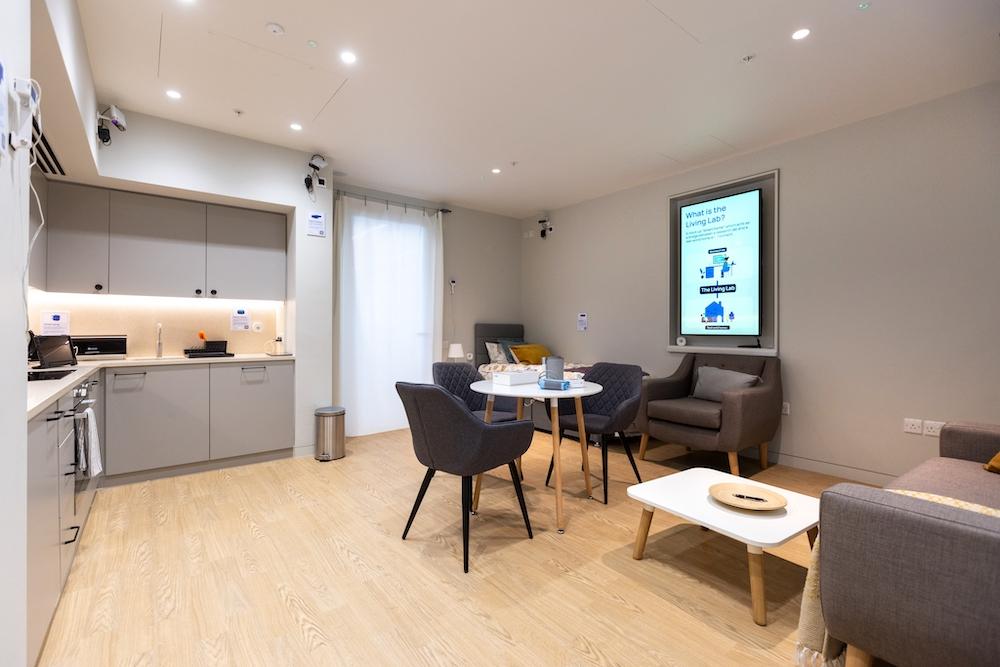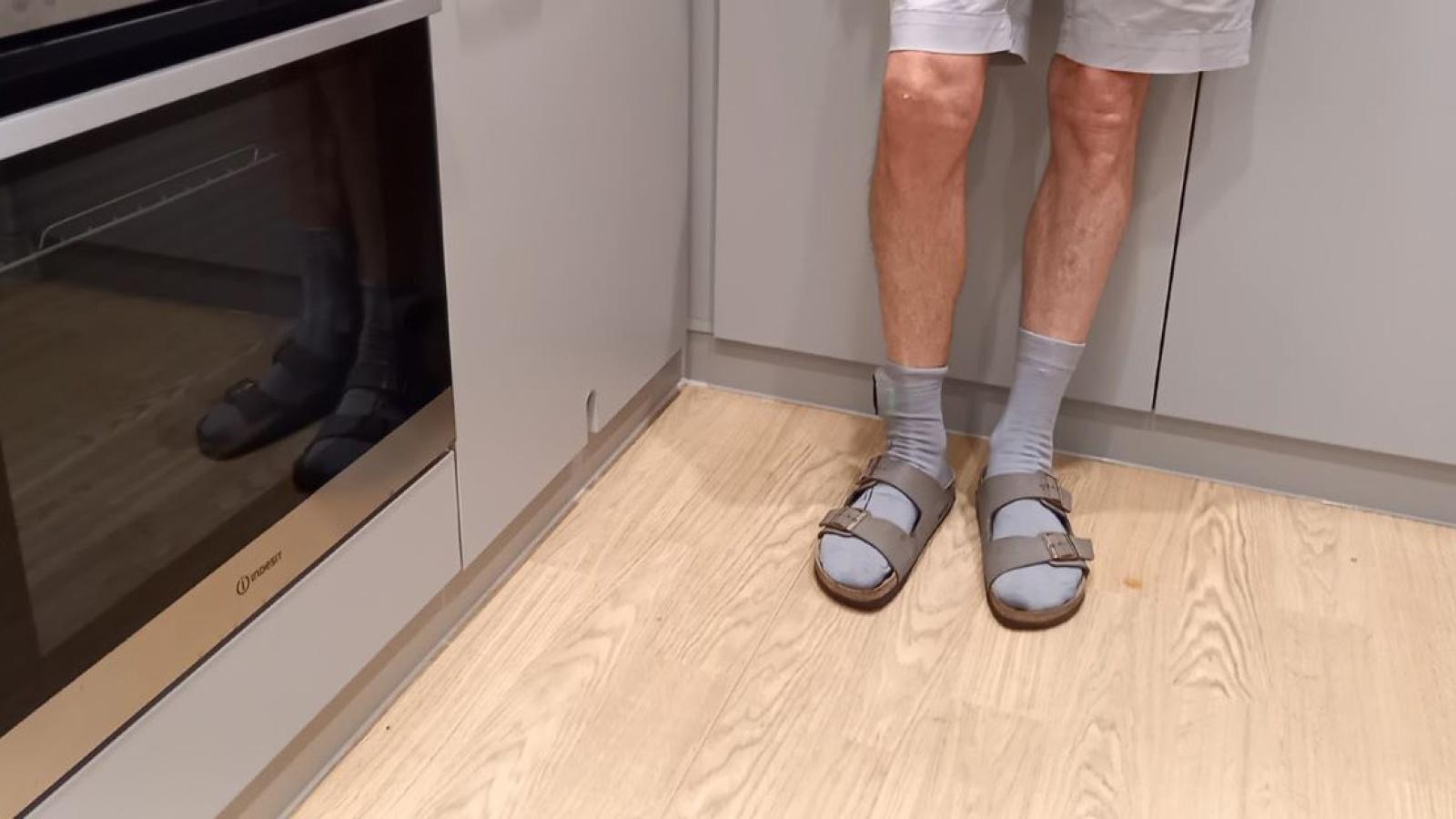A new project led by Dr Shlomi Haar (UK DRI Care Research & Technology Centre) will test whether a sock which combines sensors with artificial intelligence could help carers detect agitation and prevent falls in people with dementia.
The innovative ‘SmartSocks’ track heart rate, sweat levels and motion to give insight into the wearers wellbeing, providing accurate insight into a person’s cognitive state, and distress levels. They look and feel like normal socks, do not need charging and are machine washable. Current wearable technology approaches are worn on wrist straps, which can stigmatise or even cause more stress, and are frequently removed by patients.
Care technology start-up Milbotix, who developed the SmartSocks, has partnered with teams at two UK institutions to test the technology. In one project, Milbotix is working with the UK DRI Care Research & Technology Centre at Imperial College London, who are developing ‘smart home’ technology to support people living with dementia to remain in their own homes for as long as possible.
In this study, the team will first test the SmartSocks in their living lab, a domestic environment where they study activities of daily living and develop technologies before they can be tested in the home. Then they will deploy the tech in the homes of 15 people living with dementia to assess the capability of the socks to detect distress and agitation in the wearer.
In a second, separate study, Milbotix is working with the University of Exeter to test whether SmartSocks can help staff working in care homes support people who may not be able to communicate agitation, or the cause of distress. Milbotix is trialing SmartSocks in a network of care homes managed by Southern Healthcare, with a research team at the University of Exeter evaluating the pilot study. Both studies are funded by Innovate UK.
people living with dementia will try out the socks in the study
As a world leading centre in developing smart homes for dementia we have tried multiple wearable devices but we find the technology is not always suitable or comfortable for people to wear for extended periods. This incredibly innovative technology should resolve this issue, since the socks look and feel exactly like normal socks.Dr Shlomi HaarEmerging Leader at the UK DRI Care Research & Technology Centre
SmartSock inventor Dr Zeke Steer, Chief Executive Officer of care-tech start-up company Milbotix, came up with the concept after witnessing his great grandmother’s dementia journey, during which she became aggressive and anxious. Desperate to help progress care, Dr Steer gave up his job in the defence industry to take up a PhD in robotics, where he developed an interest around wearable technologies.
Dr Steer said:
“I came up with the idea for SmartSocks while volunteering in a dementia care home. The current product is the result of extensive research, consultation and development.
The foot is actually a great place to collect data about stress, and socks are a familiar piece of clothing that people wear every day, Our research shows that the socks can accurately recognise signs of stress – which could really help not just those with dementia, but their carers too.”

will be trialled in the living lab first
The UK DRI Care Research & Technology Centre is already piloting technology that monitors sleep, movement around the home, and physiological measurements such as temperature and blood pressure. A centralized computer platform called ‘Minder’ platform connects these measurements to a dashboard, enabling clinicians to remotely monitor people living with dementia. Using this tech, the team aims to be able to detect problems early, reduce avoidable hospitalizations and ultimately empower people living with dementia to remain independent within their own homes for longer.
With the addition of the SmartSocks, clinicians will be able to remotely detect when a person’s cognitive state changes, which is not possible with the existing devices.
Dr Shlomi Haar, Emerging Leader at the UK DRI Care Research & Technology Centre, said:
“I’m really excited about this project, which has the potential to transform care for people affected by dementia. As a world leading centre in developing smart homes for dementia we tried multiple wearable devices but we find the technology is not always suitable or comfortable for people to wear for extended periods. This incredibly innovative technology should resolve this issue, since the socks look and feel exactly like normal socks.
Combining the socks with our existing technology will greatly expand our capabilities to monitor, understand and anticipate the needs of people living with dementia, and support them to remain safely within their own homes for longer, whilst also reducing the burden on carers.”
Sarah Daniels, Health and Social Care Lead at the UK DRI Care Research & Technology Centre, said:
“Wearable devices are fast becoming an important way of monitoring health and activity. At our centre, we have been trialing a range of wrist bands and watches. However, these devices present a number of challenges for older adults and people affected by dementia: they don’t hold charge for long; people often remove and subsequently misplace them.
We have also found that those who like to wear a watch, prefer to wear their own, and that those with more fragile skin are at risk of pressure areas and skin irritation. The SmartSocks offer a new and promising alternative which could avoid many of these issues. I am excited to be involved in this project and look forward to working with the product around the acceptability and accessibility for people affected by dementia.”
SmartSocks will be trialed in people with dementia living in care homes owned by Southern Healthcare, located across the Southwest of England. Dr Byron Creese, at the University of Exeter, will evaluate their efficacy at providing early alerts to staff of heightened agitation, the risk of falls, and whether SmartSocks improves care.
In Exeter, the research is supported by the Exeter NIHR Biomedical Research Centre. Dr Byron Creese, of the University of Exeter, said:
“SmartSocks addresses the huge clinical need for effective and safe management of agitation, pain and distress in dementia. We have world-leading research and clinical expertise in these aspects of dementia and we’re really excited to be joining Milbotix™ on this project.”
The development of SmartSocks was supported by Alzheimer's Society via their Accelerator Programme.
To find out more about Dr Shlomi Haar's work, visit his UK DRI profile. To stay up to date on the latest research news and Institute updates, sign up to receive our monthly newsletter, ‘Inside Eye on UK DRI'.
Article published: 10 August 2023
Banner image: Imperial College London
